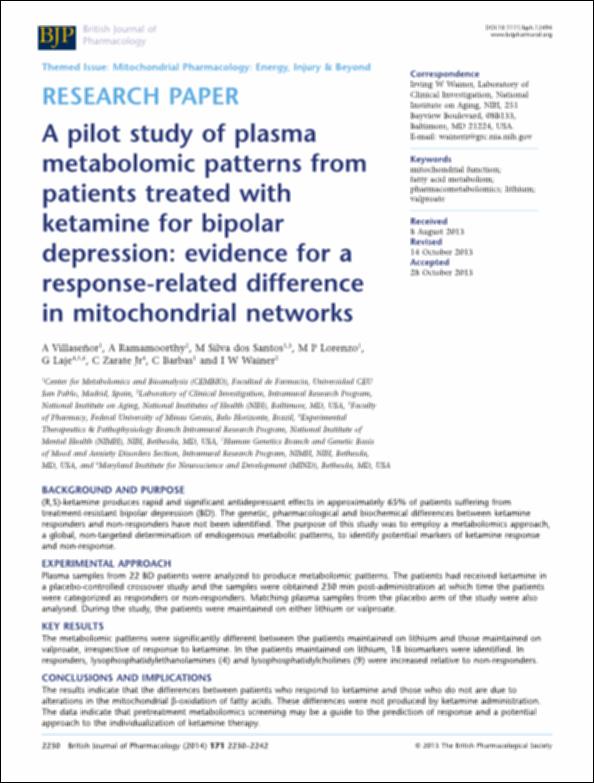Please use this identifier to cite or link to this item:
http://hdl.handle.net/10637/13000A pilot study of plasma metabolomic patterns from patients treated with ketamine for bipolar depression : evidence for a response-related difference in mitochondrial networks.
| Title: | A pilot study of plasma metabolomic patterns from patients treated with ketamine for bipolar depression : evidence for a response-related difference in mitochondrial networks. |
| Authors : | Barbas Arribas, Coral. Lorenzo García, María Paz Villaseñor Solis, Alma Cristina Ramamoorthy, A. Silva dos Santos, M. Laje, G. Zarate, C. Wainer, I.W. |
| Abstract: | BACKGROUND AND PURPOSE (R,S)-ketamine produces rapid and significant antidepressant effects in approximately 65% of patients suffering from treatment-resistant bipolar depression (BD). The genetic, pharmacological and biochemical differences between ketamine responders and non-responders have not been identified. The purpose of this study was to employ a metabolomics approach, a global, non-targeted determination of endogenous metabolic patterns, to identify potential markers of ketamine response and non-response. EXPERIMENTAL APPROACH Plasma samples from 22 BD patients were analyzed to produce metabolomic patterns. The patients had received ketamine in a placebo-controlled crossover study and the samples were obtained 230 min post-administration at which time the patients were categorized as responders or non-responders. Matching plasma samples from the placebo arm of the study were also analysed. During the study, the patients were maintained on either lithium or valproate. KEY RESULTS The metabolomic patterns were significantly different between the patients maintained on lithium and those maintained on valproate, irrespective of response to ketamine. In the patients maintained on lithium, 18 biomarkers were identified. In responders, lysophosphatidylethanolamines (4) and lysophosphatidylcholines (9) were increased relative to non-responders. CONCLUSIONS AND IMPLICATIONS The results indicate that the differences between patients who respond to ketamine and those who do not are due to alterations in the mitochondrial β-oxidation of fatty acids. These differences were not produced by ketamine administration. The data indicate that pretreatment metabolomics screening may be a guide to the prediction of response and a potential approach to the individualization of ketamine therapy. |
| Description: | En: British Journal of Pharmacology. ISSN 1476-5381 2014, 171, 8: 2230 - 2242 |
| URI: | http://hdl.handle.net/10637/13000 |
| Rights : | http://creativecommons.org/licenses/by-nc-nd/4.0/deed.es |
| Issue Date: | 15-Sep-2014 |
| Center : | Universidad San Pablo-CEU |
| Appears in Collections: | Facultad de Farmacia |
Items in DSpace are protected by copyright, with all rights reserved, unless otherwise indicated.


